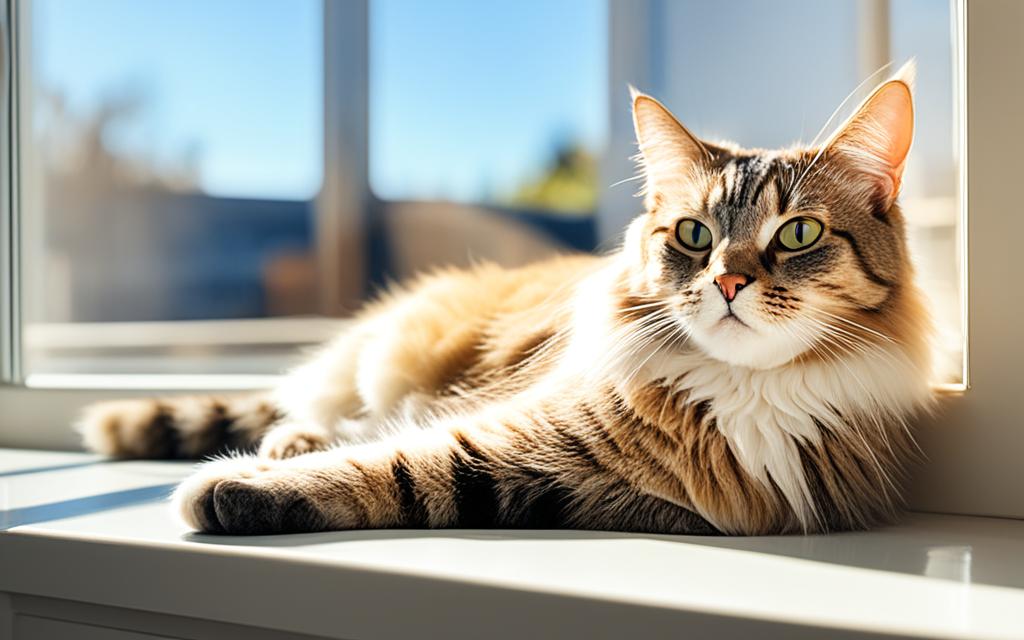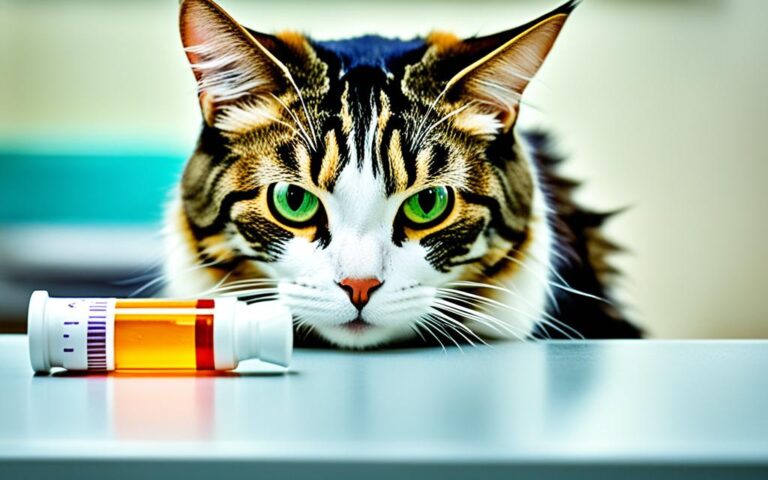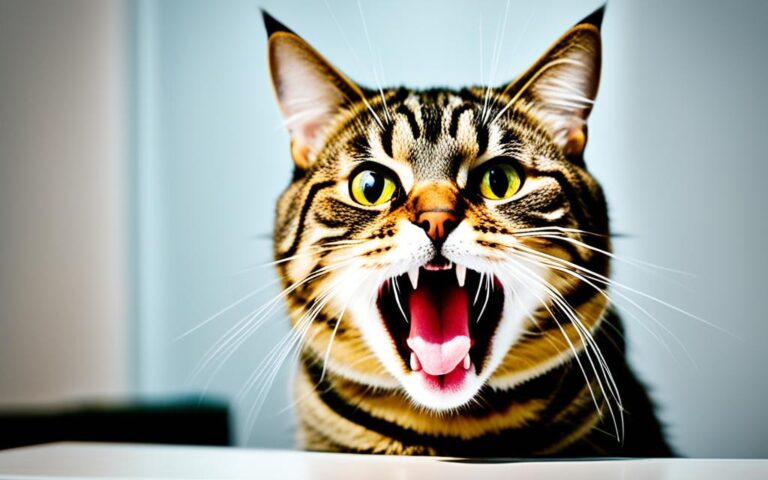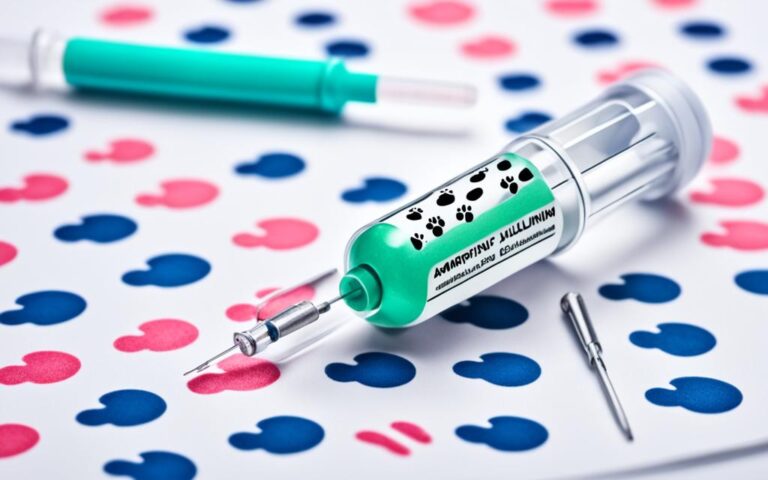Budesonide for cats: Uses, Benefits, and Side Effects
About 85% of cats with inflammatory bowel disease (IBD) get better with budesonide1. This offers hope for treating IBD in cats. Budesonide is a powerful steroid that works through the whole body. It’s used “off-label” in pets, meaning not for its original purpose. Knowing what budesonide can do and its possible effects is key for pet folks and vets alike.
Key Takeaways
- Budesonide helps with inflammatory bowel disease (IBD) in cats and dogs.
- It’s made to start working in the gut first, which usually means less side effects overall.
- Common effects in pets are more hunger, thirst, and changes in their hair.
- Use budesonide carefully in pets with stomach ulcers, infections, diabetes, or eye problems.
- Keep an eye on your pet for any negative reactions while using budesonide.
Table of Contents
What is Budesonide?
Definition and Overview
Budesonide is a special kind of medicine. It mainly acts in the area where it is put. This makes it useful in treating Inflammatory Bowel Disease (IBD) in cats and dogs2. Even though it’s not directly approved for pets, special drugstores can mix it for them2. This medicine is strong and helps with IBD and certain types of colitis in pets3.
Brand Names and Forms
You can find budesonide in different ways for animals. There are capsules, tablets, liquids, and even gels that you put on the skin4. The common types are the 3 mg and 9 mg capsules4. For pets, non-enteric-coated versions work best because they have IBD closer to the beginning of their stomachs2.
Budesonide is very strong, about 15 times more than prednisolone. So, giving the right amount is very important to avoid side effects4. For cats with asthma, vets might suggest a budesonide that they breathe in4.
How Budesonide Works for Cats
Mode of Action
Oral budesonide works by delaying its activation until it reaches the gut5. This way, it fights inflammation right where it’s needed5. It uses less medicine to do its job, so there are fewer side effects all over the body5.
It’s about 15 times stronger than prednisolone6. Budesonide reduces gut swelling by stopping certain chemicals that cause it6. This is how it helps cats with diseases like IBD.
The dose for cats with gut problems is usually 0.5-1.0 mg a day7. It may change depending on how the cat responds or how bad the condition is7. Keep an eye on the levels of ACTH and cortisol in the blood while using this medicine6.
Budesonide is different from other steroids because it’s generally safe for cats6. But, make sure to give it the right way. Don’t crush or mix the capsules unless the vet says so. This can mess with how well the medicine works6.
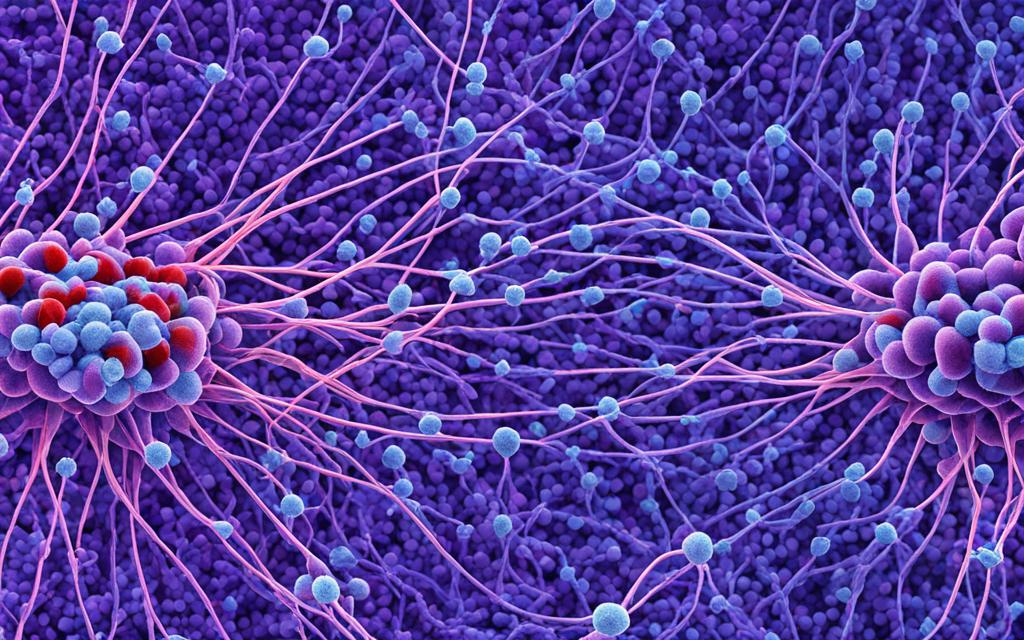
To wrap up, budesonide targets the gut for treating diseases like IBD5. Because of its strength and how it’s used, budesonide is a great choice for digestive issues in cats6.
Budesonide for Inflammatory Bowel Disease in Cats
Inflammatory bowel disease (IBD) is common in cats and affects their gut8. Feline IBD can come in different types, such as lymphocytic-plasmacytic enteritis and eosinophilic gastroenteritis8. Cats with IBD show signs like throwing up, having loose bowel movements, losing weight, and feeling tired8.
To diagnose IBD in cats, vets look at clinical signs and run tests8. They also take intestinal biopsies. Changing the cat’s diet helps manage this disease. Vets usually suggest hypoallergenic meals and foods with a lot of fiber and little fat8. Giving antibiotics like metronidazole or tylosin can also be part of the treatment8.
For more severe cases, cats might need corticosteroids like prednisolone to lower inflammation8. In rare situations, cats could get other drugs to suppress their immune system8. But, with proper care, most cats with IBD get better8.
Budesonide is a man-made corticosteroid often used to treat IBD in cats as an alternative to older drugs9. It works mainly on the stomach and has a moderate absorption For some cats, especially those with severe IBD, they might absorb more budesonide. This can cause side effects like feeling hungry all the time or drinking and urinating a lot more9.
It’s important to know that budesonide can effect how other medications work in your cat9. Never stop giving budesonide to a cat suddenly. This can be very dangerous and might even cause the cat to die9.
| Type of Feline IBD | Characteristics |
|---|---|
| Lymphocytic-plasmatic enteritis | Infiltration of lymphocytes and plasma cells in the intestinal lining |
| Eosinophilic enteritis | Increased presence of eosinophils in the intestinal tract |
| Small intestinal bacterial overgrowth | Excessive growth of bacteria in the small intestine |
| Lymphangiectasia | Dilation of the lymphatic vessels in the intestine |
Budesonide seems like a good option for IBD in cats, but monitoring for side effects is key9. It’s important to keep an eye on how the cat is doing with the treatment. And be ready to deal with any unexpected reactions9.
While budesonide is often used in dogs, not much is known about its benefits and risks for cats yet5. Dogs’ stomach acid is different from humans, which affects how budesonide works5. Dogs with gut issues might not respond very well to budesonide5.
“Budesonide has been proposed for patients intolerant to systemic steroids, with limited evidence of fewer adverse effects compared to other oral glucocorticoids.”
In summary, budesonide might be a good choice for treating IBD in cats, but more studies are necessary9. Vets should weigh the pros and cons before starting this therapy with their cat. It could offer a new way to manage IBD that’s safer than traditional options985.
Benefits of Budesonide for Cats
Budesonide is a new kind of corticosteroid for managing IBD in cats10. It holds several advantages over older medications. This steroid targets the gut well and reduces health risks by absorbing less through the cat’s body11.
Advantages over Other Corticosteroids
Budesonide’s special feature is its effect mainly in the gut. This means it’s less likely to have widespread side effects11. For cats, this focused treatment is great. It means they’re less likely to suffer from the usual long-term steroid issues.
Moreover, it’s been found that budesonide might not affect the cat’s hormone balance as much as other steroids. This is key for keeping your cat’s hormones in check, lowering the chance of gland problems10.
Budesonide also works well for IBD symptoms in both dogs and cats11. Many studies have shown positive results. Pets with chronic gut issues, including IBD, often do well with budesonide treatment11.

Budesonide is also good for pet owners because of its cost-effectiveness. While it might be a bit pricey at first, the lower risk of side effects and exhaustive monitoring can make it a better choice long-term11.
In summary, budesonide stands out for its gut-focused effect, less bodily absorption, and fewer side effects. That’s why it’s a top choice for treating IBD and similar conditions in cats101112.
Administering Budesonide to Cats
Dosage and Frequency
Budesonide is a daily treatment for inflammatory bowel disease in cats13. The right dose and when to give it are very important. Vets prescribe the right amount based on your cat’s size. Small cats need smaller doses. They might even need a special dose made by a pharmacy14.
Directions for Use
Follow your vet’s instructions closely when giving budesonide. If you miss a dose, give it when you remember. But, if it’s almost time for the next dose, just wait. Don’t double up the doses.
You can give budesonide with or without food. But feeding your cat with it might help avoid tummy troubles13Mixing budesonide with certain drugs could harm your cat. So, always tell your vet about other medicines your cat takes1315.
“Budesonide is about fifteen times stronger than prednisolone.”13
Budesonide capsules need stomach acid to break down. Keep them at room temperature1314. Always follow your vet’s advice to give your cat the best chance with budesonide131514.
Potential Side Effects of Budesonide in Cats
If your cat is taking budesonide, owners need to know about its side effects16. The cat might eat and drink more and have more hair16. But, if it shows bad signs like losing muscle, weakness, or its belly gets bigger, get help fast16.
Common Side Effects
Budesonide can lead to some common issues, like excessive drinking or eating, and a change in the coat17. Yet, these problems are usually not as bad as with some other similar drugs16.
Precautions and Contraindications
Cats with certain health issues should be careful with budesonide, such as those with infections17. Doctors must know what other medicines the cat is taking, as budesonide might not mix well with them17. Also, pregnant or nursing cats shouldn’t use this medicine18.
Don’t keep extra budesonide for later, and don’t share it with other animals17. Your vet will need to check your cat often while taking this drug to make sure it’s safe and working well17.
“Accidental consumption by humans should prompt immediate consultation with a primary care physician or poison control center for guidance on managing the situation.”
Drug Interactions with Budesonide
Budesonide is a powerful medicine for inflammatory conditions in cats. When used with other drugs, vets need to be careful. This makes sure the cat’s treatment works well and is safe19.
Some drugs can stop CYP3A from working properly. CYP3A is an enzyme that breaks down budesonide. Because of this, cats should not take budesonide with some drugs like erythromycin or ketoconazole19. Also, antacids can break down budesonide’s protective cover. This might reduce how well the cat’s body absorbs the medicine. But, taking budesonide with omeprazole seems to be okay, at least in humans19.
Budesonide can interact with over 500 different medicines19. These can be major, moderate, or minor in how serious they are. Commonly, vets check if budesonide works okay with drugs like Advair Diskus or Benadryl before giving it to cats19.
Budesonide might also be tricky for cats with certain health issues. It could cause problems in conditions like liver disease or infections. Vets must watch out for these and adjust treatment as needed19.
Knowing about budesonide’s interactions is important for vets. This knowledge helps them treat cats better and safely. Vets carefully check the cat’s health and other medicines to avoid problems19.
Budesonide Monitoring and Storage
When giving your cat budesonide, watch them closely for bad reactions20. Your vet might check them often and do blood tests. This makes sure the medicine is helping without any problems20.
Storing budesonide right keeps it working well and safe. Store the capsules at room temperature in a sealed, dark, and dry place21. It’s okay for them to be in temperatures from 15°C to 30°C (59°F–86°F) for a short time21. For special mixed medicines, follow the storage instructions from the pharmacy20.
Storing budesonide correctly and watching how your cat reacts is really important20. This makes the medicine work better and lowers the chance of side effects. These steps help keep your cat healthy during their treatment.
Always talk with your vet when your cat is taking budesonide. Working together ensures your pet’s condition is well managed safely and effectively202122.
Budesonide for cats: Uses, Benefits, and Side Effects
Budesonide is a type of corticosteroid helping cats with intestinal problems like IBD23. It’s special because it aims for fewer side effects outside the intestines23. Veterinarians also use it to treat sinus or lung issues in cats24.
What makes budesonide great is its focus on the gut23. Most of it doesn’t spread in the body and cause harm. This reduces many negative effects seen with other steroids23. The usual dose is about 1 mg a day, but this can vary23.
This medicine can be pricier, but it’s beneficial for cats with gut issues23. Because it doesn’t travel much in the body, it could be safer for long periods23. Yet, it might not work well if the bad part of the gut doesn’t get in touch with it23.
Budesonide might cause some problems if used for a long time. These include a weaker immune system, diabetes, and a condition known as Cushing’s disease24. Cat owners need to watch closely how their felines react. Always consult with a vet for the best use of this drug23.
“Budesonide is a steroid medication that helps reduce inflammation in the body, making it useful for managing conditions like inflammatory bowel disease in cats.”
In short, budesonide is a useful option for cats with IBD and similar ailments. It’s designed to work better in the intestines and carry fewer risks outside. However, as with any treatment, the help of a vet is crucial for its safe and effective use in pets.
Comparing Budesonide with Other Corticosteroids
Budesonide is a new type of corticosteroid. It’s becoming popular for treating inflammatory conditions in cats. Research shows it might be less risky than older medications like prednisolone25. This means it could be a better choice for cats that don’t do well with the usual side effects.
Efficacy, Cost, and Side Effect Comparison
Comparing budesonide to others, such as prednisone, is key. Prednisone and prednisolone work well for feline IBD. But budesonide is up to 15 times more effective locally in the gut2326. Dexamethasone is 5 to 7 times more powerful than prednisolone26.
Budesonide might cost more but the benefits outweigh the cost for some cases23. Especially for cats that haven’t improved with other medicines. It’s less likely to cause whole-body side effects than other types23. This is because most of it works in the gut first.
Although less likely, budesonide can still cause some of the same issues over time. This includes the risk of diabetes. Vets have to watch cats closely when they use budesonide23.
Choosing budesonide over older drugs has clear benefits for cats with IBD. It offers focused treatment in the gut and less risk of full-body effects. Still, any decision to use it should involve a vet. They can consider the cat’s specific health needs and history262523.
Essential Drug Information Table
Veterinarians have several options for treating feline health issues, like the drug budesonide. We’ve put together a key information table on budesonide. It shows important details about this drug and how it helps cats.
| Common Names | Budesonide |
|---|---|
| Drug Type | Corticosteroid |
| Used For | Inflammatory bowel disease, asthma, and other inflammatory conditions in cats |
| Administered | Oral tablets or liquid |
| FDA Approved | No, but used off-label in veterinary medicine |
Budesonide is a man-made corticosteroid with a lot of research behind it. It’s great for treating many cat health problems. Some think it’s better than other drugs in its class because it works well with fewer side effects.
To use budesonide safely in cats, vets need to think about the right dose and how to give it. They also watch out for any bad side effects closely2728. Regular check-ups are key to keeping your cat safe while on this medicine.
Knowing this drug’s key points helps everyone involved. Pet owners and vets can work together better. They can give their cats the care they need for inflammation issues.
Conclusion
In summary, budesonide is proving to be a key choice for treating different cat illnesses like inflammatory bowel disease29. It doesn’t seem to affect blood pressure, blood sugar, or certain heart enzymes much. But it does lead to some heart changes.
One study showed that budesonide and prednisone had similar success rates in treating cat bowel disease. They also had similar side effects30.
Budesonide works well because it’s strong against inflammation but doesn’t spread throughout the body much. This means less side effects for our furry friends. Knowing this, vets can choose budesonide to keep their patients safe and healthy31.
Veterinary medicine is always growing. More research and real-life experience with budesonide will show us even more. This will help both pet owners and vets make better treatment choices.
FAQ
What is budesonide and how is it used in cats?
How does budesonide work for cats with IBD?
What are the benefits of using budesonide in cats?
How should budesonide be administered to cats?
What are some potential side effects of budesonide in cats?
Are there any precautions or drug interactions to be aware of with budesonide?
How should budesonide be stored and monitored for cats?
Source Links
- Uses, Dosage & Side Effects
- Budesonide for Dogs and Cats
- Budesonide for Inflammatory Bowel Disease » AVRIO Pharmacy
- Budesonide (Entocord, Uceris)
- Budesonide Therapy for GI disease in Dogs and Cats – ScriptWorks, Compounding Pharmacy in Walnut Creek, California
- Budesonide for animals
- How to Treat Feline Inflammatory Bowel Disease
- Feline Inflammatory Bowel Disease: Treating IBD in Cats
- Feline Inflammatory Bowel Disease Treatment With Budesonide
- Aetiology of inflammatory bowel disease in companion animals
- Inflammatory Bowel Disease (IBD) in Dogs and Cats
- Inflammatory Bowel Disease (IBD) in Dogs and Cats – Ethos Veterinary Health
- Mar Vista Animal Medical Center
- Budesonide for Cats: Dosage, Safety & Side Effects – Cats.com
- Settling Down Your Pet’s IBD With Budesonide – Local Pharmacy North Carolina | Pharmacist – Josefs Pharmacy
- Update on managing inflammatory bowel disease and intestinal lymphoma in cats (Proceedings)
- Pet Factsheets – Crossriggs Veterinary Clinic
- Budesonide for Cats
- Budesonide Interactions Checker – Drugs.com
- Budesonide: MedlinePlus Drug Information
- No title found
- Introduction to Steroids
- Side Effects Of Injectable and Oral Steroids In Cats
- Budesonide for Dogs and Cats
- Which Drugs Are Used to Manage Feline Inflammatory Bowel Disease?
- How to manage feline chronic diarrhea, Part II: Treatment
- Immunosuppressant Therapy in Small Animal Medicine: What, When, and Why
- Echocardiographic and biomarker evidence of plasma volume expansion after short‐term steroids administered orally in cats
- In dogs with chronic enteropathy (idiopathic inflammatory bowel disease) is budesonide more effective than prednisolone or prednisone in resolving clinical signs?
- Budesonide – an overview | ScienceDirect Topics

